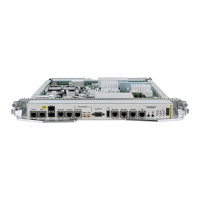Configuring Modular QoS Congestion Management on Cisco ASR 9000 Series Routers
How to Configure QoS Congestion Management on Cisco ASR 9000 Series Routers
QC-52
Cisco ASR 9000 Series Aggregation Services Router Modular Quality of Service Configuration Guide
OL-23108-02
11. exit
12. exit
13. interface type interface-path-id
14. service-policy {input | output} policy-map
15. end
or
commit
16. show policy-map interface type interface-path-id [input | output]
DETAILED STEPS
Command or Action Purpose
Step 1
configure
Example:
RP/0/RSP0/CPU0:router# configure
Enters global configuration mode.
Step 2
policy-map
policy-name
Example:
RP/0/RSP0/CPU0:router(config)# policy-map
policy1
Enters policy map configuration mode.
• Creates or modifies a policy map that can be attached to
one or more interfaces to specify a service policy.
Step 3
class
class-name
Example:
RP/0/RSP0/CPU0:router(config-pmap)# class
class1
Specifies the name of the class whose policy you want to
create or change.
Step 4
bandwidth {
rate
[
units
]| percent
percentage-value
}
Example:
RP/0/RSP0/CPU0:router(config-pmap-c)# bandwidth
percent 40
Enters policy map class configuration mode.
• Specifies the bandwidth allocated for a class belonging
to a policy map.
• In this example, class class1 is guaranteed 40 percent of
the interface bandwidth.
Step 5
exit
Example:
RP/0/RSP0/CPU0:router(config-pmap-c)# exit
Returns the router to policy map configuration mode.
Step 6
class
class-name
Example:
RP/0/RSP0/CPU0:router(config-pmap)# class
class2
Specifies the name of the class whose policy you want to
create or change.

